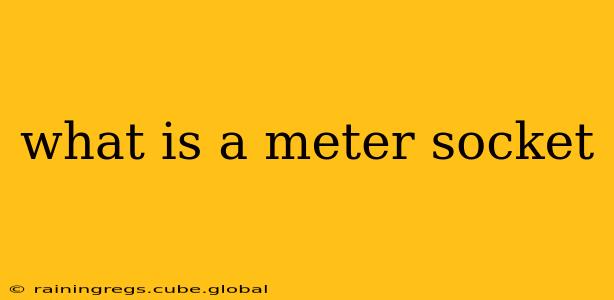A meter socket is a crucial component of your home's electrical system, often overlooked despite its vital role. It's the secure enclosure that houses the electric meter, the device that measures your electricity consumption. Understanding its function, location, and safety aspects is essential for every homeowner. This guide will delve into everything you need to know about meter sockets.
What Does a Meter Socket Do?
The primary function of a meter socket is to provide a safe and accessible connection point between the power company's electrical grid and your home's electrical service. It acts as a protective barrier, shielding the meter and the connection points from the elements and accidental contact. The meter itself measures the amount of electricity your home consumes, sending that data back to the utility company for billing purposes. The socket provides a secure connection for the meter to receive power and transmit usage data.
Where is the Meter Socket Located?
Typically, the meter socket is located on the exterior of your home, often on the side or back, near where the power lines enter. Its location is usually chosen to provide easy access for utility workers to read the meter and perform maintenance. This convenient placement minimizes the need for workers to enter your property. You might find it on a wall, a post, or even within a small, weatherproof box.
What are the Different Types of Meter Sockets?
Meter sockets come in various types, primarily categorized by the number of wires and their voltage:
- Single-phase meter sockets: These are the most common type found in residential settings and handle single-phase power.
- Three-phase meter sockets: These are used in larger homes or commercial buildings that require higher voltage and power.
- Different amperage ratings: Meter sockets are available with different amperage ratings to accommodate varying power demands. The higher the amperage rating, the more power the socket can handle.
How Does a Meter Socket Work?
The process is relatively straightforward:
- Power from the grid: Electricity flows from the power grid through the power lines to the meter socket.
- Meter measurement: The meter, housed within the socket, precisely measures the electricity consumption.
- Power to the home: After passing through the meter, the electricity is then safely transferred to your home's electrical panel, distributing power throughout your house.
Is it Safe to Touch a Meter Socket?
No. Never attempt to touch or tamper with the meter socket or the meter itself. It carries high-voltage electricity that can be fatal. Only qualified electricians or utility workers should access or work on this equipment. Contact your local utility company immediately if you suspect a problem with your meter socket.
Who is Responsible for Maintaining the Meter Socket?
Usually, the responsibility for maintaining the meter socket is divided:
- Utility company: The utility company is typically responsible for the meter itself and its connection to the power grid.
- Homeowner: The homeowner is usually responsible for the physical condition of the meter socket enclosure, ensuring it's secure, weatherproof, and free from damage. Any damage should be reported to the utility company immediately.
What Happens if My Meter Socket is Damaged?
A damaged meter socket poses serious safety hazards and can interrupt your electrical service. Report any damage—such as cracks, loose wires, or signs of water intrusion—to your local utility company immediately. They will arrange for an inspection and necessary repairs or replacements.
How Often Should I Check My Meter Socket?
While you shouldn't directly interact with the socket, a regular visual inspection during exterior home maintenance checks is recommended. Look for any obvious signs of damage, like cracks, loose parts, or signs of tampering. If anything looks amiss, report it to your utility company.
By understanding the role and function of your meter socket, you can better ensure the safety and reliability of your home's electrical system. Remember to always prioritize safety and contact the appropriate professionals for any concerns or repairs.
